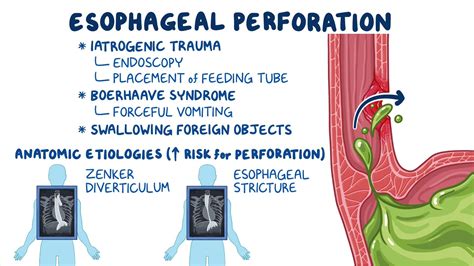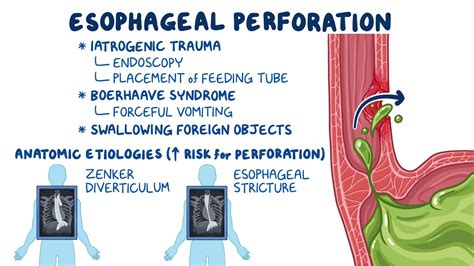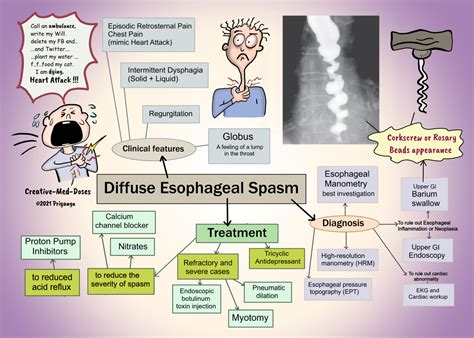Intro
Discover 5 effective esophageal spasm treatments, including medication, lifestyle changes, and natural remedies, to alleviate symptoms of esophageal dysphagia, chest pain, and difficulty swallowing, and learn how to manage esophageal spasms and promote digestive health.
Esophageal spasms are a type of disorder that affects the esophagus, the muscular tube that carries food from the throat to the stomach. This condition can cause chest pain, difficulty swallowing, and a feeling of food getting stuck in the throat. Esophageal spasms can be uncomfortable and disrupt daily life, making it essential to explore treatment options. In this article, we will delve into the world of esophageal spasm treatments, discussing the various methods available to manage and alleviate symptoms.
The importance of treating esophageal spasms lies in the impact it has on a person's quality of life. When left untreated, esophageal spasms can lead to complications such as malnutrition, dehydration, and even pneumonia. Furthermore, the pain and discomfort associated with esophageal spasms can cause anxiety and stress, making it crucial to find effective treatment options. With the right treatment, individuals can manage their symptoms, reduce the frequency and severity of esophageal spasms, and improve their overall well-being.
Esophageal spasms can be caused by a variety of factors, including gastroesophageal reflux disease (GERD), stress, and certain medications. Understanding the underlying cause of esophageal spasms is vital in developing an effective treatment plan. By addressing the root cause of the condition, individuals can reduce their symptoms and prevent future episodes. In the following sections, we will explore the different treatment options available for esophageal spasms, including lifestyle changes, medications, and alternative therapies.
Understanding Esophageal Spasms

Causes of Esophageal Spasms
The causes of esophageal spasms can be varied, including: * Gastroesophageal reflux disease (GERD) * Stress and anxiety * Certain medications, such as antibiotics and bisphosphonates * Food allergies or intolerances * Esophageal conditions, such as esophagitis or esophageal strictureLifestyle Changes for Esophageal Spasm Treatment

Benefits of Lifestyle Changes
The benefits of lifestyle changes for esophageal spasm treatment include: * Reduced symptoms, such as chest pain and difficulty swallowing * Improved overall health and well-being * Reduced risk of complications, such as malnutrition and dehydration * Increased energy and reduced fatigue * Improved mental health and reduced stress and anxietyMedications for Esophageal Spasm Treatment

Types of Medications
Some common medications used to treat esophageal spasms include: * Omeprazole (Prilosec) to reduce stomach acid * Dicyclomine (Bentyl) to relax the muscles in the esophagus * Alprazolam (Xanax) to reduce anxiety and stress * Ibuprofen (Advil) to alleviate chest pain and discomfortAlternative Therapies for Esophageal Spasm Treatment

Benefits of Alternative Therapies
The benefits of alternative therapies for esophageal spasm treatment include: * Reduced symptoms, such as chest pain and difficulty swallowing * Improved overall health and well-being * Reduced risk of complications, such as malnutrition and dehydration * Increased energy and reduced fatigue * Improved mental health and reduced stress and anxietySurgical Options for Esophageal Spasm Treatment

Risks and Benefits of Surgery
The risks and benefits of surgery for esophageal spasm treatment include: * Risks: bleeding, infection, and respiratory complications * Benefits: improved swallowing, reduced symptoms, and improved overall healthManaging Esophageal Spasms

Tips for Managing Esophageal Spasms
Some tips for managing esophageal spasms include: * Keeping a food diary to track trigger foods and symptoms * Practicing relaxation techniques, such as deep breathing and meditation, to reduce stress and anxiety * Getting regular exercise to improve overall health and reduce stress * Avoiding lying down after eating to reduce pressure on the esophagus * Staying hydrated to reduce symptoms and improve overall healthWhat are the symptoms of esophageal spasms?
+The symptoms of esophageal spasms include chest pain, difficulty swallowing, and a feeling of food getting stuck in the throat.
What are the causes of esophageal spasms?
+The causes of esophageal spasms include gastroesophageal reflux disease (GERD), stress and anxiety, certain medications, food allergies or intolerances, and esophageal conditions.
How are esophageal spasms diagnosed?
+Esophageal spasms are diagnosed through a combination of physical examination, medical history, and diagnostic tests, such as endoscopy and manometry.
What are the treatment options for esophageal spasms?
+The treatment options for esophageal spasms include lifestyle changes, medications, alternative therapies, and surgery.
Can esophageal spasms be prevented?
+Esophageal spasms can be prevented by making lifestyle changes, such as eating smaller meals, avoiding trigger foods, and reducing stress and anxiety.
In
